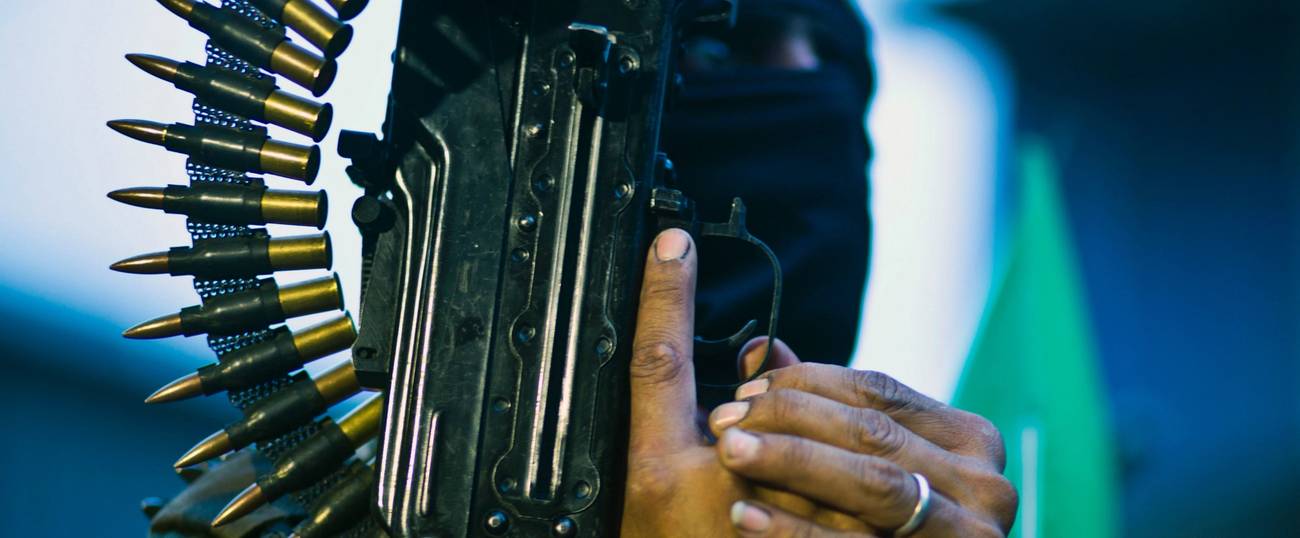Shin Bet Accuses Gaza Aid Worker of Channeling Money to Hamas
International aid organizations have long subsidized Hamas’s activities in the Gaza Strip




Thursday brought a rude awakening for anyone who’s donated to the Christian aid organization World Vision’s branch in the Gaza Strip. As Haaretz reported, Israeli authorities charged Mohammad el-Halabi, the head of the organization’s Gaza operations, with sending as much as 60 percent of his office’s funds to Hamas’s military wing. Shin Bet, Israel’s internal security agency, alleges that el-Halabi, who lost seven relatives during the 2014 conflict between Hamas and Gaza, had been a member of Hamas’s al-Qassam brigades since 2004 and had been tasked with infiltrating World Vision. El-Helabi used his position to divert tens of thousands of dollars earmarked for needy Gazans to salaries and bonuses for Hamas fighters, and to assist in other military-related activities, like tunnel construction.
There’s something especially perverse about channeling money meant for hungry or homeless civilian war victims to a terrorist organization that hides its fighters among that same civilian population, in order to launch hundreds of attacks aimed at a neighboring civilian population. El-Halabi is no scapegoat, but he’s also an extreme example of a problem so pervasive, and so built into the architecture of the Israeli-Palestinian conflict, that it isn’t even widely recognized as a problem.
The international aid apparatus subsidizes Hamas’s activities in the Strip, and has in some respects been captive to the organization. Aid organizations provide many of the key public services in the territory, thus freeing up resources (and tamping down public frustration) to the benefit of the reigning authorities in Gaza—which is to say Hamas. The moral hazard problem long predates el-Halabi’s alleged wrongdoing.
The UN and its donors are among the most deeply implicated here. The United Nations Works and Relief Agency (UNWRA), the disproportionately U.S.-funded UN agency responsible for aiding Palestinian refugees, spent about $627 million in the Strip last year, much of it on such quasi-governmental functions such as education, healthcare, and the construction of buildings damaged in the 2014 conflict with Israel. A not-insignificant amount of Hamas’s tax base likely derives from foreign aid: Gaza’s total GDP (according to these detailed quarterly reports from the UN) was roughly $1.9 billion in 2015, with “public administration and defense”—Hamas’s primary activities in the Strip—accounting for 28.2 percent of Gaza’s GDP in the first quarter of 2015 (as compared to just 6.8 percent in the non-Hamas-controlled West Bank). Meanwhile, UNWRA counts some 1.3 million registered refugees in Gaza, which has a population of 1.8 million—meaning that a solid majority of people in the Strip are eligible for the UN’s services.
The aid regime does more than simply provide revenue, economic activity and a baseline of human development for the Strip’s Hamas authorities. Like effective political and social organizations the world over, Hamas has also grown adept at capturing public services and infrastructure—which, in the Gaza Strip, happen to be largely operated through aid organizations. In 2009, Hamas effectively convinced UNWRA not to include the Holocaust in the curriculum at UNWRA schools; in 2012, Hamas and its allies won 25 out of 27 seats on the committee that controls the union for UNWRA’s 10,000 Palestinian workers in the Strip. And during the 2014 Gaza conflict, rockets were repeatedly found within UNWRA schools—which wasn’t just a war crime, but evidence of how much the lines between the Strip’s militant organizations and its aid apparatushad blurred.
None of this is reason to deny much-needed assistance to even a single Gazan. As I witnessed first-hand during a brief November 2014 reporting trip to Gaza for Business Insider, Gaza is a desperate and isolated place, with a vulnerable, impoverished, and traumatized population. And the moral hazard problem isn’t unique to Gaza. Aid organizations often face the quandary of figuring out how to help people victimized by circumstances beyond their direct control, but without inadvertently empowering or helping the people responsible for creating those circumstances in the first place. Gaza is not a failure quite on the scale of say, Eastern Zaire in the mid-90s, where genocidaires and the remnants of the deposed Hutu supremacist government from neighboring Rwanda took shelter in refugee camps, triggering a bloody and atrocity-filled Rwandan invasion of the region. But with the UN and the aid community effectively freeing up resources for a Hamas government, all while committing themselves to rebuilding the Strip whenever that government launches wasteful and vindictive wars against Israeli civilians, it’s a failure nonetheless.
Observers on radically opposite sides of the conflict have had a surprisinglysimilar critique of the UN’s aid activities in Gaza, claiming that the World Body sustains an untenable status quo in the region. In late 2014, anti-Zionist firebrand Ali Abunimah accused the UN of being “complicit” in the Israeli “siege” of Gaza because it was so closely adhering to Israel’s rules for delivering aid to the region. Around the same time, then-Commentary web editor Seth Mandel wrote that UNRWA “perpetuates the Israeli-Palestinian conflict” because of its alleged underwriting of the entire Palestinian refugee issue. For both critics, aid, and the politics around the delivery of aid, serve as a means of turning temporary realities into permanent aspects of the conflict, while forestalling any chance of the (admittedly very different) final status outcomes that both writers advocate.
Mohammad el-Halabi is certainly to blame for co-opting an aid organization on Hamas’s behalf. But he’s just a particularly stark example of a more insidious and fundamental problem.
Armin Rosen is a staff writer for Tablet Magazine.